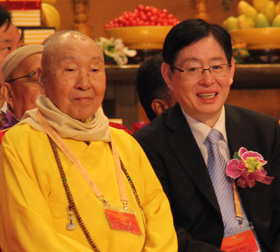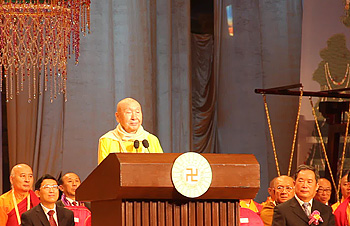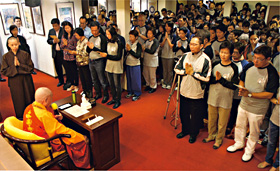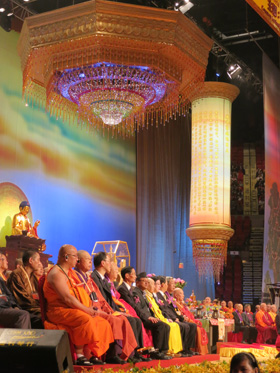导师 上惟下觉大和尚应邀参加第三届世界佛教论坛
|
|||||||
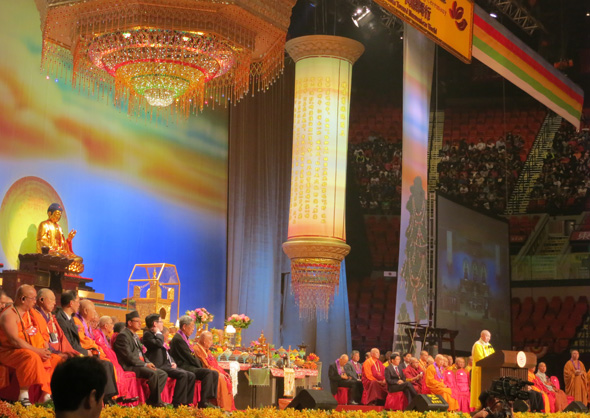 由中国佛教协会、香港佛教联合会和中华宗教文化交流协会联合主办的第三届世界佛教论坛,于二○一二年四月二十五日至二十七日在香港红磡体育馆举行。身为论坛发起人之一,导师 上惟下觉大和尚亦受邀参加,并于开幕式作主旨发言。论坛共邀请五十多个国家地区佛教领袖、学者专家莅会,更于论坛期间(四月二十六日至三十日)迎奉南京栖霞寺佛顶骨舍利至港,开放广大信众瞻礼祈福。此外,论坛举行七场次的论题讨论及五场电视网路论坛,开幕式当天并有千僧过堂、著名歌手献唱《心经》及论坛主题曲“同愿同行”等行程。 同愿同行 净土可期
二十六日上午八时三十分举行的开幕式中,千僧万众齐诵《心经》,随后宣读贺信,香港特别行政区行政长官曾荫权、香港佛教联合会会长觉光长老、中国佛教协会会长传印长老、全国政协副主席董建华致辞并进行启幕仪式后,播放联合国文明联盟主席帕桑约的视频演讲,开始发言行程。
最后, 导师希冀藉由世界佛教论坛一再凝聚的共识与力量,为佛教的弘扬奠定良善的基础,进而开启每个人的心灵视野,让全世界人类都能重视文化的力量,加强文化的交流,为世界和谐、两岸和合带来无穷尽的光明与希望。 随后,中国佛教协会副会长班禅.额尔德尼.确吉杰布大师、孟加拉佛教复兴会会长苏塔难陀大长老、全国人大常委会副委员长许嘉璐、尼泊尔文化和国家结构改革部长蓝毗尼开发委员会主席吉拉迪、大韩佛教曹溪宗中央宗会议掌权者普善长老、中日友好宗教者恳话会会长持田日勇法师、台湾中国佛教会理事长圆宗长老、斯里兰卡全锡兰佛教会主席贾噶特等代表分别发表主旨演讲后,在场嘉宾瞻礼供奉于主坛中央的佛顶骨舍利,开幕式圆满结束。 香江法水 普润有情 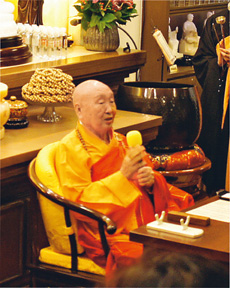 二十六日晚间八时, 导师应香江信众祈请,于香港普广精舍慈悲开示及传授三皈依。近一千名信众云集,共有近四百人把握殊胜因缘皈依 导师座下,成为三宝弟子。此次是首度在普广精舍传授三皈依, 导师赞叹大众的发心,并开示:佛法以人为根本,人以心为根本,心以觉悟为根本。人有物质生活、精神生活、伦理生活、道德生活、功德生活及最高的心灵世界。一般人只知道追求物质生活,由于物质生活是有限的、刺激性的,无法使人得到满足。佛法属于心灵的世界,所谓“心灵的世界”,即“明心见性,见性成佛”,也就是大众听法这念心。这念心要定、要净、要明,要广大、要平等、要超越自己。 二十六日晚间八时, 导师应香江信众祈请,于香港普广精舍慈悲开示及传授三皈依。近一千名信众云集,共有近四百人把握殊胜因缘皈依 导师座下,成为三宝弟子。此次是首度在普广精舍传授三皈依, 导师赞叹大众的发心,并开示:佛法以人为根本,人以心为根本,心以觉悟为根本。人有物质生活、精神生活、伦理生活、道德生活、功德生活及最高的心灵世界。一般人只知道追求物质生活,由于物质生活是有限的、刺激性的,无法使人得到满足。佛法属于心灵的世界,所谓“心灵的世界”,即“明心见性,见性成佛”,也就是大众听法这念心。这念心要定、要净、要明,要广大、要平等、要超越自己。一切都在这念心当中。心清净了,就能超越自我、超越世间所有相对的境界能不受外境的影响,走到任何地方都很自在。能掌握这念心,人生就很愉快,这个世界就是净土世界。菩萨以禅悦为食,法喜充满,这念心达到一念不生,就是禅悦。人有三世因果,过去的已经过去了,只要从现在开始努力,不放弃自己,立定目标、立定愿望,“勿以善小而不为,勿以恶小而为之”,广积福慧资粮,活在世界上就很有价值、很有意义。 导师并为大众开示皈依、持戒、忏悔的意义与功德。法会至晚间九时三十分功德圆满,一行于翌日返回台湾,圆满此行。
和谐世界 同愿同行 导师 上惟下觉大和尚于第三届世界佛教论坛主题发言 佛教发源于印度,生根于中国,弘扬于世界,兴盛于现代。千百年来,之所以能成为社会和谐、人心安定的基石,端赖历代祖师大德、诸大善知识的伟大行愿,传演佛陀觉悟的教育,一步一脚印,散播菩提心苗。 古德云:“有行无愿,其行必孤;有愿无行,其愿必虚。”愿是我们的心愿、期望和目标;行,则是我们的具体行动。智者大师在《释禅波罗蜜》亦说:“有愿而无行,如欲度人彼岸,不肯备于船筏,当知常在此岸,终不得度。如病者须药,得而不服,当知病者,必定不差。”也就是说知行必须合一,行愿更需要同步。因此,小至家国,大至宇宙世界,是否能够同愿同行、相互理解?在在关系着是否能够和谐共生、和乐发展以及和平共存? 几千年的血缘、文化与思想融合,造就了中华民族的存在。文化是我们人类在历史发展过程中创造的总成果,包含宗教、道德、艺术、科学等各方面。现今的中国,不但是“经济大国”、“政治强国”,更是独步全球的“文化王国”。中国博大精深的文化底蕴以及穿越千古的丰富艺术典藏,让人难望其项背。古人云:“修文化而服遐荒,耀武威而平九有。”温家宝总理日前也曾表达:“难道几千年的文化恩泽,就不能消弭几十年的政治恩怨?”诚然,透过文化交流对话,是化除对立心结的良方。 王阳明说:“行之明觉精察处便是知,知之真切笃实处便是行。”我们深切地知道:和谐世界,需要物质文明与精神文明齐同并进的发展。因此,不管从宗教、道德、艺术、科学……哪个方面着手起,佛法的慈悲、智慧与中华传统文化,无疑是士农工商、男女老幼……同愿同行对话的平台。所谓“圣人之治天下也,先文德而后武力。”由此可见人文教化的重要性。 有“人”才有“文化”,如何才能将一个恶人变成好人、好人变成贤人、贤人变成圣人?佛法是觉悟的教育,直接了当、直指入处告诉我们人以“心”为根本,心以“觉”为根本。今天在此第三届世界佛教论坛盛会,海内外高贤云集,探究“和谐世界,同愿同行”的重要性,本人谨以中台山僧团同愿同行之规约总纲──中台四箴行:“对上以敬,对下以慈,对人以和,对事以真”为例,提出佛法与中华传统文化之“敬、慈、和、真”精神,作为维系伦理秩序的方针。上、下、人、事,已包罗世出世间日常生活所有层面。从自己做起,从日常生活做起,对上以敬,以恭敬心除去我慢;对下以慈,以慈悲心去除瞋恚;对人以和,以和合心去除粗暴;对事以真,以真诚心去除虚伪。以此应对进退、待人接物,僧团和敬,不但能成就个人道业,更能齐心协力弘扬佛法,从山林走向社会,从中国迈向世界,广行菩萨的愿行大道,传播菩提觉性种子。
A Harmonious World is Built upon the Unification of Aspirations and Actions Grand Master Wei-Chueh's keynote speech at the Third World Buddhist Forum Buddhism originated in India, took root in China, spread throughout the world, and is thriving to the present time. For thousands of years, Buddhism has been a cornerstone of harmony in society and a source of peace and serenity for humanity. This is because of the great vows and conducts of past patriarchs and masters, faithfully transmitting the Buddha's teachings of enlightenment, spreading bodhi seeds in the minds of sentient beings each and every step of the way. An ancient maxim states, "Action without a vow is limited; a vow without action is vacuous." Vows are expressions of our will, aspirations, and goals, and actions are actual steps we perform to realize these vows. In "The Exposition of Dhyana Paramita", Venerable Master Zhiyi says, "Making vows without action is akin to a person promising to ferry people to the other shore but unwilling to prepare boats or rafts. As such, people will remain on this shore forever, never getting across. It is also akin to an ill person having the medicine needed but never taking it; he will not be cured." Understanding and practice should be unified, just as vows and actions must be in full accord. Therefore, whether families, societies, nations, and the world can co-exist peacefully and make beneficial progress relies critically on whether their aspirations and actions lead to mutual understanding and consensus. The Chinese people are defined not only by blood relations, but also by integration of diverse cultures, thoughts, and ideologies through thousands of years. A culture is the sum total of human creations throughout history, including religion, ethics, arts, sciences, etc. Today, China is not only a great economic and political power, but as a great "kingdom of culture" unsurpassed by any nation. China has accumulated an immense wealth of cultural and artistic achievements and treasures throughout the millennia. There is an ancient saying, "Nourish the culture to civilize the wild tribes." Premier Wen Jiabao recently said, "Cannot thousands of years of culture and grace eliminate decades of political grievances?" Cultural exchange and dialogue is an effective remedy for untying the knots of conflicts. The Ming Dynasty scholar Wang Yangming said, "Action with complete clarity and attention to details is knowledge. Knowledge grounded in unbiased, actual understanding is action." We understand and feel deeply that a world of harmony requires simultaneous material and spiritual progress. A common dialogue of shared aspirations and action, Buddhist compassion and wisdom, and the Chinese traditional culture form a platform in which all can partake: scholars, engineers, artisans, merchants, and farmers; male, female, young, or old. This is regardless of the subject area of religion, ethics, art, or science and technology. There is a saying, "A sage rules the world foremost with education, culture, and virtue; force is last," which stresses the importance of cultural education. Civilization arises from people. How does one change an evil person into a good person, a good person into a virtuous person, and a virtuous person into a sage? Buddhism is the education of enlightenment. It directly points to the mind as the basis of people, and "awareness" as the basis of the mind. Today, many wise and virtuous people are gathered here at the Third World Buddhist Forum. They are here to investigate the significance of "A Harmonious World is Built upon the Unification of Aspirations and Actions." I humbly present the shared vows and practices at Chung Tai Shan Sangha as epitomized in the Four Tenets of Chung Tai: "To our elders be respectful, to our juniors be kind; with all humanity be harmonious, in all endeavors be true." These are the guidelines for order and ethical conduct based on the principles, common in Buddhism and Chinese philosophy, of "respect", "kindness", "harmony", and "truth". The Four Tenets encompass all aspects of our life, both at mundane and transcendental levels. We must begin with ourselves in our daily actions. "To our elders be respectful"—with a mind of respect we eradicate our arrogance. "To our juniors be kind"—with a mind of kindness we remove our anger and hatred. "With all humanity be harmonious"—with a mind of harmony we eliminate our rudeness and violence. "In all endeavors be true"—with a sincere and truthful mind we extinguish deception. These principles develop good behaviors and interpersonal skills, and create a respectful and harmonious sangha. They not only complete our personal cultivation, but also unite us in propagating the Buddha Dharma—from mountain monastery to the people; we practice the Great Bodhisattva Way and spread bodhi seeds of awakening from China to the whole world. The First World Buddhist Forum in April of 2006 took place at Hangzhou and Zhoushan of Zhejiang Province in China. The topic was "A Harmonious World Begins with the Mind". More than one thousand eminent Buddhist venerables from 37 countries and regions participated. The Second World Buddhist Forum in March of 2009 took place at Wuxi Lingshan Brahma Palace and Taipei. The theme was "Creating Conditions for a Harmonious World". Almost two thousand Buddhist masters, scholars, academics, and others from 50 countries and regions gathered to exchange ideas and expertise. Each Forum brought great inspiration and joy to participants. The Third World Buddhist Forum is well prepared and Hong Kong, the Pearl of the East, is the host. Sponsors include the Buddhist Association of China, the Hong Kong Buddhist Association, and the China Religious Culture Communication Association. I believe that with the accumulation of past experiences, we will continue to make progress as in the saying, "Having reached the tip of the hundred foot pole, go further." This great World Buddhist Forum will once again reinforce our common aspirations, and empower us not only to establish a wholesome foundation for Dharma propagation, but also to broaden everyone's spiritual landscape. We hope to bring greater emphasis on the value of culture, further cultural exchanges, and unlimited light and hope to a harmonious world and the cross-strait peace. Finally, I sincerely wish every honored guest auspiciousness and peace, and that this Forum shall be a great success. |
单元首页
